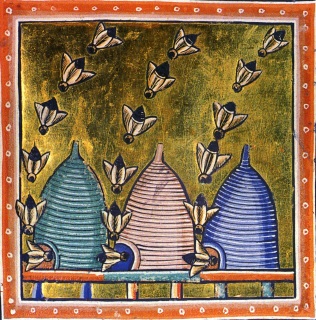 |
| http://www.nwibeekeepers.com/about.aspx |
Humanity's relationship with the bee, and more importantly its products, has been underway since well before we started writing anything down. Just like many other animals (bears, birds, honey badgers, and other primates), humans have long exploited the bees' honey production for cheap and tasty calories. We also seem to have found a use or two for bees' wax along the way. Honey bees can be found throughout the world (for the most part) and have been actively harvested by humans for quite some time.
The first methods of honey collection, naturally, involved ransacking wild hives. Hunter-gatherers depicted these interactions in some of their artwork. However, the world over, we have been trying to find a better way to get along for quite some time. Domestication has been ongoing since at least the Ancient Egyptians (ca 2422 BCE).
We eventually figured out that through the application of smoke, calming the bees by initiating the feeding response (a resource preserving reaction to the hive potentially being destroyed by fire), bees would not sting the shit out of you. Of course the stinging is a natural reaction for the bees, since harvesting basically entails the destruction of its home, young, food stores, and potentially the queen.
It seems that fixed comb hives were used exclusively until the 19th Century. This construct is almost exactly what it sounds like (except that the hives could be moved). The hopeful beekeeper would construct a chamber amenable to occupation and lure a swarm from a natural hive (or other artificial hives) nearby. The trouble remained that in harvesting the honey or the comb, the beekeeper would destroy the hive (it wasn't until the development of the movable frame hive that this problem was eliminated). Hive design varied from region to region, dependent largely upon the materials at hand.
 |
| https://beeglue.wordpress.com/about-beekeeping/history-of-beekeeping/ |
A variety of commercial products are made from harvested bee colonies, including: honey, beeswax, pollen, royal jelly, and propolis. Honey is obviously a food product by itself, but can also be used to make mead and has many medicinal applications (effective and not so much, depending on the use). Beeswax is turned into candles, but is also an ingredient in polishes and beauty products (yeah, mustache wax). Pollen, while perhaps the least desirable extract, can also be consumed. Royal jelly has a grand mythology surrounding its benefits (dubious though the truth may be), enhanced by it's limited production (only really worth harvesting from the queen's cell) and shelf-life. Propolis is what the bees use for a sealant and is the primarily employed in traditional medicines (it's also been used to bring out the wood grain in stringed instruments and for various other industrial uses).
 |
| https://nbba.files.wordpress.com/2011/06/medieval_beekeeper_1.jpg |
Extras
Some forms of wasp produce honey, as well, in hexagonal combs. However, the combs are not made from wax, but from a composite of saliva and plant materials.
While ants do not make combs, some species do store honey within the bodies of some of the young workers, known as 'repletes' (who may also store water). These repletes (with distended abdomens) hang immobile from the roof of their underground nests. Other worker ants literally tap on these workers to have them regurgitate the stored honey.
Resources
wiki - http://en.wikipedia.org/wiki/Beekeeping
Japanese - http://warre.biobees.com/japan.htm
Swiss/German - http://www.permaculture.co.uk/readers-solutions/traditional-beekeeping-bee-hotels-switzerland-and-germany
Africa - http://teca.fao.org/technology/beekeeping-africa-traditional-and-modern-beehives-and-beekeeping-equipment-0
Malta - https://naturalbeekeeper.wordpress.com/history-of-beekeeping/beekeeping-in-malta-in-the-past/
India - http://nopr.niscair.res.in/handle/123456789/13867
Beekeeping History (book) - https://books.google.com/books?id=WVh3AAAAQBAJ&pg=PA251&lpg=PA251&dq=traditional+beekeeping+in+england&source=bl&ots=-IyKYlh9jW&sig=b2Cz3FBhkp9wC7ZvJUaDha09XVM&hl=en&sa=X&ei=sBXHVPr0NNT_yQSQqIGoDg&ved=0CDUQ6AEwBg#v=onepage&q&f=false